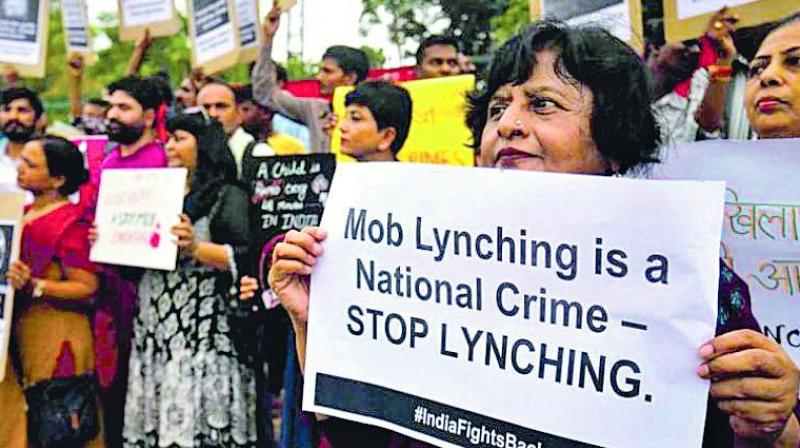Mob lynching under the aegis of law

It has often been eloquently pointed out that the recent spate of mob lynching indicates the state's indifference and denial of reality, that it is the deliberate persecution of vulnerable citizens based on hate. Lynching is a crude way of telling a section of the population that the law cannot protect them.
Most of the lynching incidents were either triggered by politically motivated individuals confident that the justice delivery system would actually protect them. If one is under the impression that most of the lynchings are about the minority, then hold back. Data reveals that women are often lynched by terming them as ‘dayans’ or witches and transgender people are lynched on the pretext of moral policing whereas migrant workers have to bear the brunt of mob violence directed towards them. Whatever the reason behind these acts, lynching per se is inhuman. It paints a grim picture of non-reliance and a complete lack of fear towards the law and law-enforcement agencies.
There are legal consequences for acts such as inculcating animosity among people belonging to different communities, molesting and harassing women, killing and beating, etc. However, there is no specific law penalising mob lynching as an offence.
Legally speaking, Section 323 of the IPC deals with punishment for voluntarily causing hurt while section 324 deals with wilfully causing hurt by dangerous weapons. Section 326 entails causing grievous hurt, and section 307 and section 302 deal with attempt to murder and punishment for murder, respectively. But in multiple instances of mob lynching, fixing the onus on individuals proves far trickier.
There have even been instances where an unruly mob has tried to implicate the police, accusing it of custodial deaths when a grievously injured victim was handed over to the police and died upon reaching the hospital. There have also been cases where the police has not acted swiftly to save the victims. Almost always, violence goes unpunished due to a collective action of a community. And often, it is the perpetrators who are supported by society for according justice. All of this has the potential to be eliminated through law. Through a recent announcement, the government is now trying to bring about a law on mob lynching as suggested by the Honourable Supreme Court in my petition.
The inept law enforcement or the lack of trust in the law of the land motivates vigilantes. The current scenario is so bad that the Supreme Court had to come out stating: “The horrendous acts of mobocracy cannot be permitted. Earnest action and concrete steps have to be taken to protect the citizens from the recurrent pattern of violence, which cannot be allowed to become “the new normal”.”
The apex court strongly feels the need to put legislation in place by Parliament even though the legislature has dragged its feet despite me making several presentations on my proposed draft legislation ‘MaSuKa’ or Manav Suraksha Kanoon.
The drafting committee headed by Sanjay Hegde, a senior advocate in the Supreme Court, worked on bringing up MaSuKa, which tries to fill in the lacunae in the law. The
proposed bill shall endeavour to cover the death of victims due to lynching, abetment, and assistance with financial aid to the mob thereto and other such acts as offences punishable under law, punishable with as grave a term as rigorous life imprisonment with a fine of '5 lakh.
With respect to the investigation of cases, the draft bill proposes that no police officer below the rank of inspector of police shall investigate any offence committed under this Act. Furthermore, when the investigating officer does not file a chargesheet within a period of three months from the date of registration of the First Information Report, such cases shall be reviewed by a committee headed by an officer of the level of inspector general of police, which is to be constituted by the state government.
The proposed bill also tries to entail the rights of the victim and witness to the incident. It also endeavours to provide compensation of sorts to victims and, in case of their death, to their family. The proposed bill states that the state government, through the office of the chief secretary, shall provide compensation to victims within 30 days of the incident. While in case of death caused due to lynching, the compensation should be less than '25 lakh. The amount of compensation shall be such as is determined by the designated judge.
The current mood of the nation requires an immediate enactment of MaSuKa.
A report published by IndiaSpend reveals that 97 per cent of all attacks centred on bovine issues between 2010 and 2017 were reported in the last three years. When a glaring 61 of a total of 63 such cases were registered after the creation of cow protection squads and beef trade restrictions, it signals that a new trend of mob violence in India has gained ground under the current dispensation (the majority of the cases has been reported in BJP-governed states).
The National Crime Records Bureau (NCRB), which tabulates and analyses crime data from across the country every year, is planning to now collect detailed data on lynchings. If the Union home ministry approves this, the NCRB will collect countrywide data on lynching incidents annually, and record causes and analyse reasons for the same.
It is important to note that lynching does not find mention in the Indian Penal Code and no particular law exists so far to deal specifically with lynching. The absence of a codified law to deal with mob violence or lynching makes it difficult to deliver justice. While Section 223(a) of the Code of Criminal Procedure, 1973 says that persons or a mob involved in the same offence in the same act can be tried together, this has not proved to have given enough legal teeth to the justice delivery system.
Of the 60 attacks over the past eight years, 58 (96.7 per cent) occurred, after the Modi government came to power, with 2016 reporting the most attacks: 25, forcing me to move the SC in 2016.
As if the data was not bad enough, the biggest irony is that in 18 attacks (30 per cent), the police registered cases against the victims and survivors and in 5 per cent of the attacks, there was no report of attackers being arrested.
The current national scenario calls for an immediate need for a special law against the menace. A special law or MaSuKa will definitely act as a deterrent. Mob lynching reflects how society has given up on any sort of humanity. Before enacting the law, the Union and state governments need to start showing solidarity towards the victims, and this humanity need not emerge just for the sake of the upcoming elections but should be strong enough to render justice to all families who have been victims to such heinous crimes because in many incidents the political class has been considerate towards lumpen vigilantes.
In the end, we must ask ourselves an important question: Has our India really become so intolerant that we look no different from a Pakistan or a Nigeria or an Afghanistan?
Tehseen Poonawalla is a leading political analyst and the petitioner in Supreme Court against mob violence.

